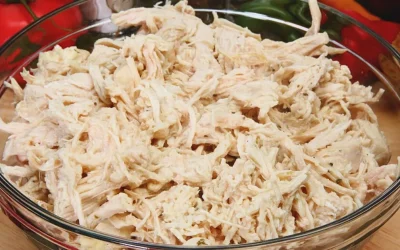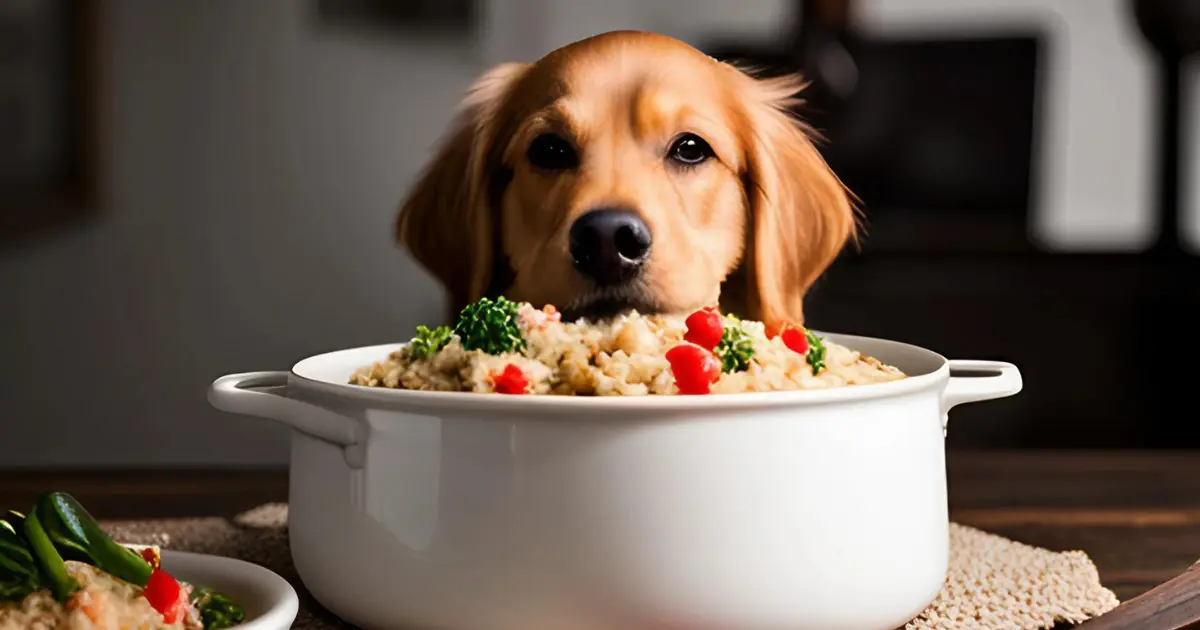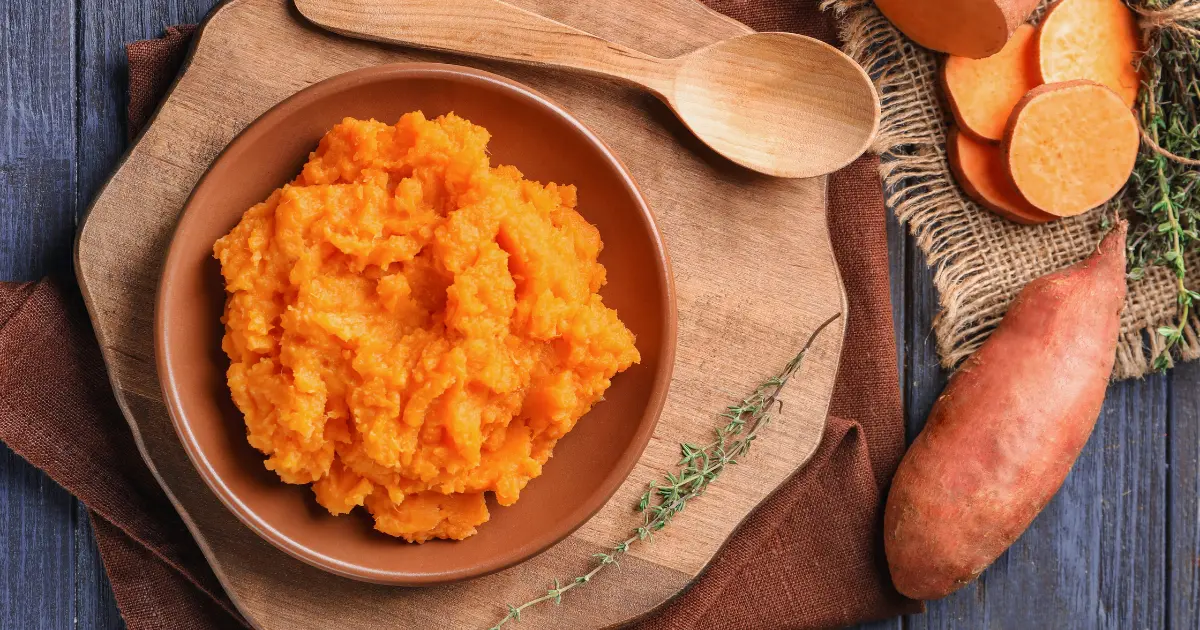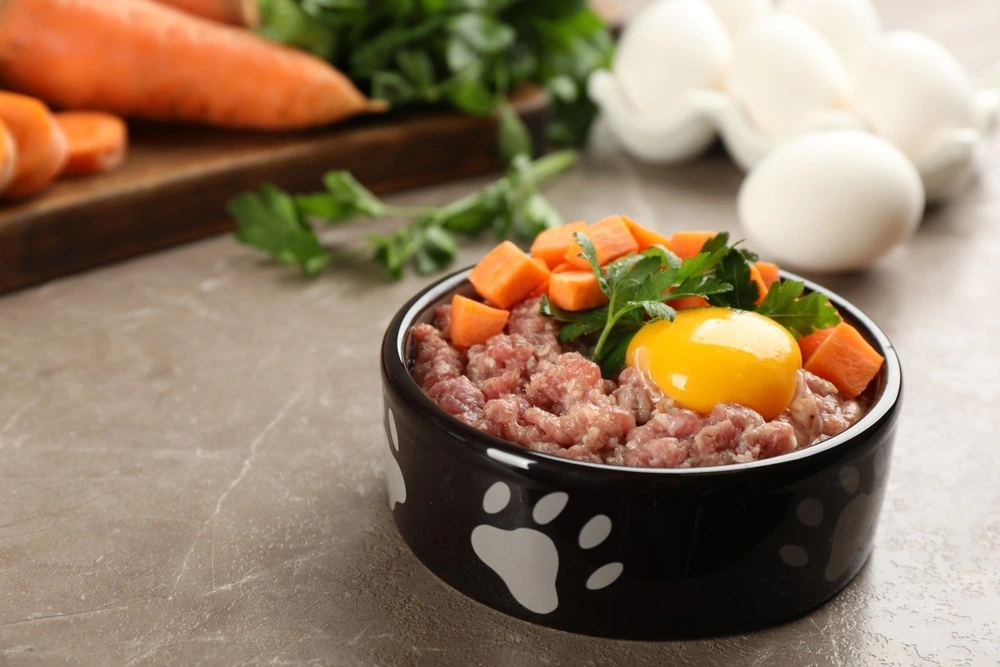What Vitamins Do Dogs need in Homemade Food
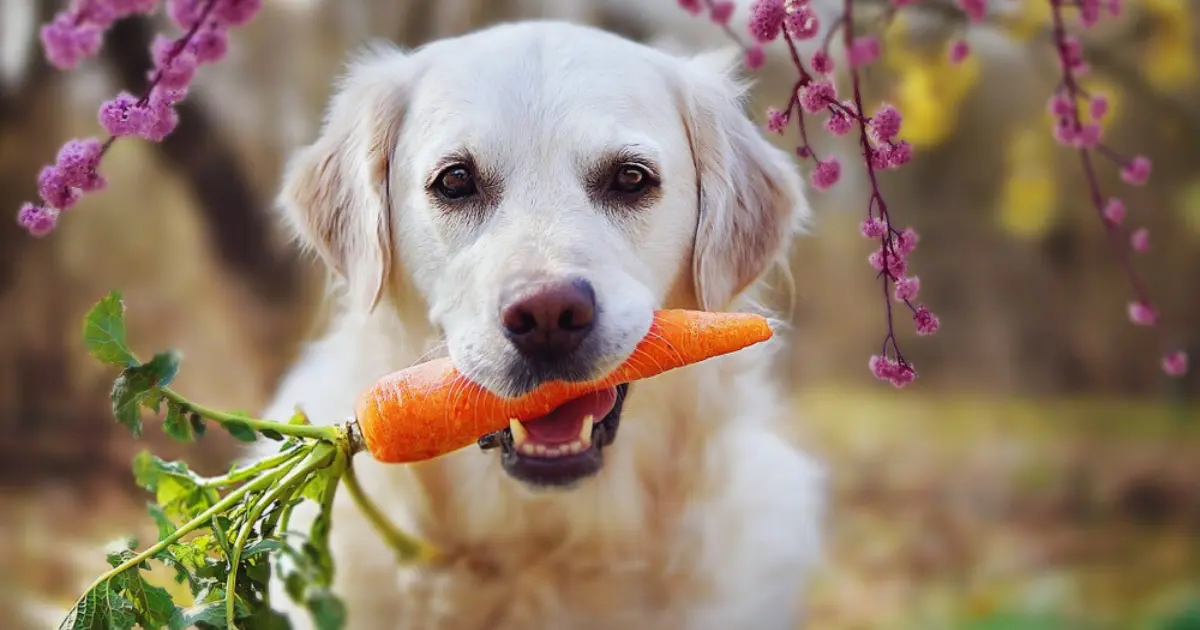
Homemade dog food is becoming increasingly famous among pet owners who want to customize the diets of their four-legged buddies. However, as with the human diet, it’s not only about packing their bowls; it’s also about ensuring they get the proper ratio of vitamins in homemade dog foods to live a long, healthy life. This comprehensive guide will walk you through the essential vitamins your dog needs and how to prepare homemade food to give them the most beneficial possible nourishment.
Why should you choose homemade dog food?
Just like the dogs who eat homemade dog food, there are many reasons why people choose it over commercial brands. Some assume that knowing exactly what’s in their puppy food inspires confidence because it presents transparency and quality management that is sometimes hard to find in processed foods. For others, customizing a diet to meet special health needs such as allergic reactions, weight control, or even recovery is a risk. The main factor is that homemade dog food organized effectively can offer freshness and customization, which many items offered in stores might need help to equalize.
Understanding Basic Dog Nutrition
Basic Nutritional Needs for Dogs
Dog health and long life require several factors, just like people. Carbs, fats, vitamins, and minerals are good for their health. The proteins heal and build muscle all over the body. Dogs require carbs to remain fit since they do lots of things. Consuming foods contains vitamins and essential fatty acids that cells need to stay healthy and work properly. Their immunity systems are strong, and minerals and vitamins give them power. For many, recognizing they should drink water is not enough to make them remember to do it.
Several variables affect what a dog needs to eat, such as its breed, age, size, health, and how active it is. Depending on the dog, they may need different energy to control their weight. Foods that are high in fat and energy help dogs grow quickly. Dogs need more energy when they’re working or playing than when they’re just sleeping. Consider a breed’s food changes if it has food allergies or other health problems. You can be sure that you are feeding your dog the right food at all stages of their lives by taking them to the vet.
Difference between Commercial and Homemade Dog Food
Concerning commercial vs. homemade dog food, people have different opinions on things like quality, nutritional balance, ease of use, and personal taste. People think that pet food groups set nutritional standards for commercial dog foods that are extremely well thought out when created. Pet owners like these features because they make things easy and constant. There are some healthy commercial options, but they aren’t always fresh and can’t be changed to suit each dog’s tastes and health requirements.
Dog owners who want full control over the quality and source of the items will like making the dog food. This approach helps owners to change a dog’s diet to address nutritional requirements, food allergies, or other problems. Organic, whole foods are thought to be better for them, and you can easily add them. But control and adaptation are issues. Making custom, well-balanced, nutritionally complete, and safe dog food requires a lot of information about how dogs naturally eat. Spending money, time, and effort on good tools and talking to veterinary experts is hard.
If a dog owner picks commercial or homemade dog food, it will depend on how well they can meet their dog’s needs while putting their health first.
Read More Article: 7 Homemade Dog Food Recipes for Skin Allergies
Which Vitamins are necessary for homemade dog food?
Vitamins are important for puppies‘ health and well-being, contributing to their overall nutritional balance. These nutrients promote various body functions, including eye-sight, skin health, brain features, and immune system functioning. Key vitamins for dogs consist of:
1. Vitamin A: It is required for eyesight, improvement, immunological features, and skin and coat health. It is discovered in foods including liver, carrots, and spinach.
2. Vitamin B complex: This contains:
– B1 (Thiamine): Essential for glucose metabolism and energy.
– Riboflavin (B2), Niacin (B3), and Pantothenic Acid (B5) are the vitamins.
– B6 (Pyridoxine): It is required for enzyme activity, energy production, and regular nervous system function.
– B7 (Biotin): Promotes healthful skin and coat.
– B9 (Folic Acid): Required for amino acid and nucleotide metabolism.
– B12 (Cobalamin) It is important for brain health and energy production. It is observed in animal products.
3. Vitamin C: Although dogs can produce vitamin C in their liver, supplementation can improve immune system characteristics, particularly in older dogs or those pressured. It has antioxidant houses.
4. Vitamin D: Required for bone health and calcium manipulation. Dogs cannot produce nutrition D from sunshine. As a result, it needs to be received from a diet, usually from fish oil or egg yolks.
5. Vitamin E: It is an antioxidant that protects against oxidative stress and is necessary for fat metabolism and cell characteristics. It is found in vegetable oils, almonds, and leafy green vegetables.
6. Vitamin k: Vital for blood clotting and bone health. Leafy vegetables and various vegetable oils are included in this ingredient.
To avoid deficiencies or toxicities, dogs must receive these vitamins in good enough quantities. Most commercially produced canine diets are designed to offer these vital vitamins in the right balance. A veterinarian or veterinary nutritionist may recommend boosting those components in homemade dog food to keep healthy and prevent nutritional imbalance. Before including supplements in your canine’s food, please consult an expert to confirm they’re vital and administered in secure dosages.
What to Feed Your Dog to Make Sure It Eats Nicely
The best way to ensure your dog gets a healthy diet is variety. You can help your dog get all the vitamins it needs by switching between high-quality ingredients of different vitamins. For example, feeding them various animal foods such as fish, poultry, and lean meat ensures they get the right amount of Vitamin A. Also, offering whole grains like brown rice or quinoa provides them with B vitamins and important minerals.
Balancing Homemade Dog Food
Determining what nutrients your dog needs will help you make healthy homemade food for them. You should make sure that the homemade dog food you provide has the right amount of fats, proteins, carbs, vitamins, and minerals. When it comes to commercial dog foods, which are made to meet all of a dog’s needs, this is not possible. Consult a veterinarian nutritionist before making a meal plan for your dog that fits its age, exercise level, and health. Some of the foods that make up a well-rounded diet are fruits and vegetables, whole grains, lean meats, and healthy fats. Always remember that balance is very important. Every meal doesn’t have to be exactly balanced. Get enough nutrients over a few days, that’s all that matters.
What Vitamins Should I Add to My Dog’s Food?
Many dog owners supplement their puppy’s food with vitamins found naturally in food. Each scenario is distinct so you should consult with your vet before making any decision. Supplements can be especially useful for dogs with certain health problems or those whose homemade food may be deficient in certain vitamins.
How to Select a Vitamin for Dogs
Selecting the right vitamin supplement for your dog requires a thorough assessment of various criteria, ensuring it meets your dog’s unique dietary requirements. First, the quality of the supplement is determined by searching for items that are evaluated and accredited by reputable organizations, including the National Animal Supplement Council (NASC). It’s essential to choose a diet that suits your dog’s age, size, and special fitness needs, such as joint support for older puppies or immune boosters for those with health concerns. It is important to consult a veterinarian as they can provide supplements based on a thorough assessment of your dog’s fitness, diet, and any current illnesses. Avoid supplements that contain artificial additives or unnecessary fillers, and choose those that list the ingredients and their amounts.
You Can Use High-Quality Ingredients
The vitamins that homemade dog food presents are linked to the quality of the ingredients used internally. Choose fresh, complete food and avoid those proven dangerous to dogs. The fresher and more natural the components, the more nutrient-dense they’ll remain.
Homemade Dog Food Recipes Rich in Vitamins
Are you ready to provide your dog with a high-quality, home-cooked meal enriched with vitamins? here are recipes to serve as a basis for creating nutrient-rich meals:
Meal: Liver delight
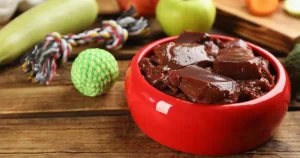
- One pound (500 g) of chicken liver
- 2 cups cooked brown rice
- One cup of pureed carrots for vitamin A.
- One tablespoon of vitamin E-rich sunflower oil
Sauté the chicken liver in the oil, then purée it while still hot. Once cooled, integrate the rice and carrots and serve.
Veggie-packed stew
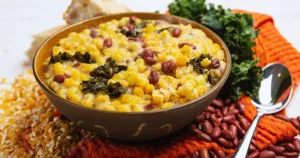
- One cup of sliced sweet potatoes for vitamin A.
- 1 cup of spinach for iron and folate (B food plan)
- For vitamin K, use one cup of chopped fresh parsley.
- Cups of lean ground beef for B vitamins.
Brown the ground meat, then blend it with the sweet potatoes and spinach. Simmer until the potatoes are soft, then toss inside the parsley before serving.
Common Things to Avoid When Making Dog Food at Home
When making dog food at home, it’s important to avoid common mistakes and items that can be harmful to your dog’s health. Here are some key things should remember:
1. Lack of nutritional balance: One of the most common mistakes is failing to provide a properly balanced diet. Dogs require a specific balance of protein, lipids, carbohydrates, vitamins, and minerals. Failure to adhere to these ratios can result in nutritional deficiencies or excesses, compromising the dog’s health.
2. Toxic foods: Some human ingredients are toxic to dogs and should not be included in their diet plan. For instance, dangerous substances for dogs include chocolate, grapes and raisins, onions and garlic, avocados, alcohol, caffeine, xylitol (a sugar-free sweetener), and macadamia nuts.
3. Too much fat: Although dogs need fat in their diet, too much fat can contribute to weight problems and pancreatitis. Avoid high-fat cuts of meat and remove the skin from poultry.
4. Bones: Cooked bones can break and cause internal damage or obstruction. If covering calcium needs with bones, crush them or provide them raw to ensure the dog can safely bite into them.
5. Spices and condiments: Many spices, including salt and spices used in human cooking, can be toxic to dogs. Cook meals plainly without adding extra flavor.
6. Not listening to the vets: If you don’t talk to a vet or veterinary specialist, you could feed your dog food that doesn’t meet his special health needs. If necessary, assist with regular Czech-American diet changes.
7. Ignoring individual needs: Depending on age, breed, length, activity level, and health status, dogs have different nutritional needs. An effective diet for one dog may not be suitable for another dog.
Potential Nutritional Risks of Homemade Dog Food
While home made dog food has numerous benefits, there also are some risks. The main concern is giving a nutritionally insufficient diet, that can cause problems and health issues in the end. To avoid this, you need to research and prepare your dog’s food plan, as well as talk with a veterinarian.
Always Consult with Your Veterinarian
Your veterinarian can be a valuable resource in checking whether your homemade dog food recipes meet your pet’s nutritional requirements. they can advise you on what to feed your dog and how much, while, and what to look at for regarding your dog’s overall health.
To summarize, giving essential vitamins in homemade dog food is possible with an understanding, preparation, and consideration of your puppy’s needs. The effort you put into making your canine’s food nutrient-dense can bring about a healthier, happier friend who lives a longer, more lively life. Remember that every dog has unique traits. As an end result, there’s no one-size-suits-all food plan. The pleasant outcomes will always come from personalized, attentive care and a willingness to find out about your pet’s dietary requirements.
FAQs:
Which vitamins are lacking from homemade dog food?
Homemade dog food frequently lacks essential vitamins D, E, and B-complex and minerals like calcium and phosphorus. Using various ingredients and checking with a veterinarian about dietary supplements can help cover nutritional shortages.
Can I offer my dog homemade food every day?
Yes, you can feed your dog home made meals on a regular basis so long as it is nutritionally balanced and meets all in their nutritional requirements. You must schedule regular appointments with a veterinary nutritionist to make sure that the meal is enough.
Should I add water to homemade dog food?
Adding water to homemade dog food can help digestion and hydration, especially for puppies who like wet meals or need to drink more. However, the quantity of water should be varied depending on the dog’s size, activity stage, and meal dryness.
What should be in homemade dog food recipes?
A well-balanced homemade canine food plan has to include a variety of protein resources (meat, fish, rooster), carbohydrates (vegetables, grains), lipids, and essential vitamins and minerals that are suitable for the canine’s age, health desires, and level of activity.
